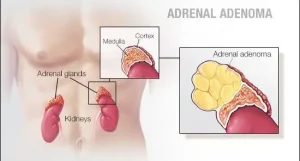Overview
Diagnosis of Adrenal Cancer
Healthcare professionals use a combination of physical exams, lab tests, imaging studies, and sometimes surgery to diagnose adrenal cancer.
Blood and Urine Tests
Lab tests may measure hormone levels produced by the adrenal glands. Hormones commonly tested include:
-
Cortisol
-
Aldosterone
-
Androgens
Abnormal levels can indicate the presence of an adrenal tumor or cancer.
Imaging Tests
Imaging tests help locate adrenal tumors and assess whether cancer has spread. Common imaging options include:
-
CT scan (computed tomography)
-
MRI (magnetic resonance imaging)
-
PET scan (positron emission tomography)
These scans provide detailed views of adrenal growths and surrounding tissues.
Surgery to Remove the Adrenal Gland
In certain cases, surgical removal of the adrenal gland (adrenalectomy) may be necessary to confirm a diagnosis. After removal, a pathologist examines the gland to determine if cancer is present.
Treatment of Adrenal Cancer
Treatment plans depend on the size, stage, and spread of the cancer. Options may include surgery, radiation therapy, chemotherapy, mitotane, and immunotherapy.
Surgery
Adrenalectomy involves removing the entire adrenal gland and may be performed to:
-
Confirm adrenal cancer diagnosis
-
Remove as much cancer as possible
-
Assess whether cancer has spread
-
Ease symptoms, including those caused by excess cortisol or by tumor growth, such as belly or back pain
Note: If cancer has spread to nearby organs like the liver or kidney, parts of these organs may also need removal.
Radiation Therapy
Radiation therapy uses high-energy beams, such as X-rays or protons, to kill cancer cells. It may be used:
-
After surgery to destroy any remaining cancer cells
-
To relieve pain or symptoms from cancer that has spread to bones or other areas
Chemotherapy
Chemotherapy uses strong medicines to treat cancer that:
-
Cannot be fully removed with surgery
-
Recurs after surgery
It helps slow cancer growth and reduce the risk of spread.
Mitotane
Mitotane (Lysodren) is a medication for advanced adrenal cancer. It may be used:
-
After surgery to lower the risk of cancer returning
-
For cancers that cannot be fully removed
Research continues on its effectiveness for preventing recurrence.
Immunotherapy
Immunotherapy helps the body’s immune system identify and attack cancer cells. For adrenal cancer, it may be used:
-
When cancer has spread to other parts of the body
-
In cases where surgery is not possible
When to Seek Care
Seek immediate medical attention if you notice:
-
Unexplained abdominal or back pain
-
Hormonal changes such as rapid weight gain or loss, high blood pressure, or excessive hair growth
-
Symptoms of adrenal hormone imbalance
Early detection and treatment are critical to managing adrenal cancer and improving outcomes.
Advertisement

